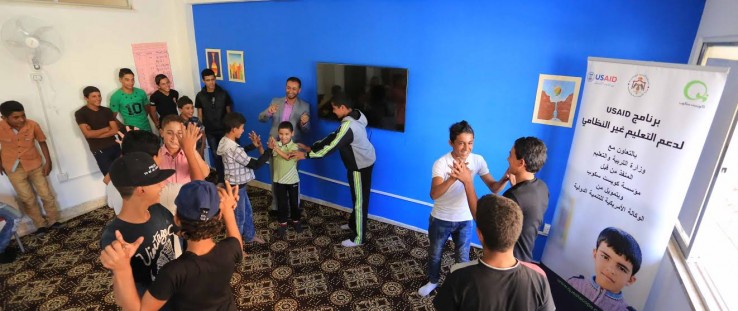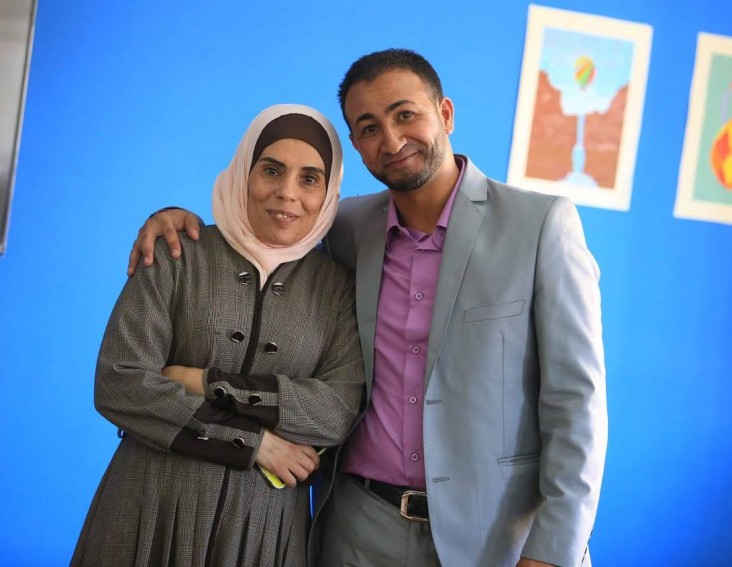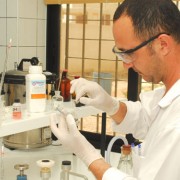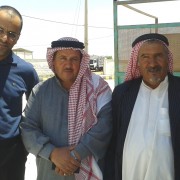 Nael Qabilat, center, with back against wall, conducts an exercise with his class.
Mohammad Magayda
Nael Qabilat, center, with back against wall, conducts an exercise with his class.
Mohammad Magayda
 Nael Qabilat, center, with back against wall, conducts an exercise with his class.
Mohammad Magayda
Nael Qabilat, center, with back against wall, conducts an exercise with his class.
Mohammad Magayda
Speeches Shim
Nael Qabilat and Diy’a Al Hawawsheh are a husband-wife team from the small Jordan village of Mleih, Madaba.
By day, the hard-working couple helps mold the next generation of the country’s citizens. Qabilat is a public school teacher and Al Hawawsheh is a social worker. On their own time, they are using their talents to help young people who have fallen through the cracks and have dropped out of school.
Both are part of a USAID-funded project that provides out-of-school youth who drop out of formal education with an alternative—NFE, or non-formal education. Questscope, the lead local organization running NFE programs, began working with Jordan’s Ministry of Education in 2003 to develop a nationwide, 24-month program that has allowed 18,000 youth to earn a 10th grade certificate of completion. The certificate qualifies graduates to return to formal education or enroll in vocational training.
In 185 centers throughout Jordan, Questscope’s NFE program, unique for the Middle East, actively engages students in their own learning process and moves away from a traditional, classical style of education. Facilitators guide students through learning focused on each individual’s educational and personal needs. By providing a welcoming and inclusive environment, NFE provides a second chance at an education for those whose educational or socioeconomic needs were not met by formal education.
Since 2015, when USAID/Jordan began funding NFE, the number of centers has expanded, allowing more than 1,000 additional students to participate.
The need is great. Youth in Jordan face multiple challenges.
They are the fastest growing demographic in the country and are experiencing an unemployment rate higher than 30 percent. What’s more, the influx of over 650,000 registered Syrian refugees into Jordan since 2011 has increased the number of out-of-school youth and strained an already overcrowded public education system.
Without education or other types of training, these youth would face challenges becoming successful, contributing members of society.
“USAID’s work with Questscope is at the heart of our approach to supporting young people to pursue their interests and follow their dreams,” said USAID/Jordan Deputy Mission Director Nancy Eslick. “It also contributes to our larger goal of assisting Jordan to boost its human resources to contribute to overall economic growth in the Kingdom.”
The Dynamic Duo
Qabilat and Hawawsheh have a goal for the students they work with: give them a second chance at a more prosperous future as adults and contributing members of society.
When Qabilat, a creative and energetic history teacher who has devoted much of his free time to volunteering in his community, heard about the NFE program, he knew he had to be a part of it. He trained as a community mobilizer, picking up strategies to locate out-of-school youth and get them back in school.
Throughout the summer of 2016, Qabilat worked from two angles. First, he met with families with sons and male relatives ages 13-20, trying to convince them that the young men would be better off going back to school than staying at home or working in low-paying jobs. He pointed out that workers without an education or other training rarely got jobs leading to careers or future advancements. Second, Qabilat talked to community leaders about the project’s importance, arguing that better-educated and more-skilled residents contribute to the overall well-being of a community.
Qabilat recruited 60 young men—both Jordanian and Syrian—for the program. “The program has been welcomed by the community, especially when they hear about the innovative educational goals that are characterized by honesty and reality,” Qabilat said. “The community welcomes the chance to strengthen the quality of education and social services provided to out-of-school youth. They know that education will have a positive impact on the morals and behaviors of our children.”
Similar to her husband, Al Hawawsheh, a trained social worker, began reaching out to mosques, schools and women’s gatherings, and on social media platforms to find young women and girls ages 13-20 who had dropped out of school.
Her objective was to return as many of the girls as possible to the classroom or, for some of them, introduce them to the formal secondary education system for the first time. Some girls leave school in the sixth or seventh grade because their parents cannot afford transportation or need them to work on behalf of the family. Some failed a grade and never went back. A few girls and young women now in the program had lived isolated from the rest of their community and had never been to school.
- 18,000 out-of-school youth served since 2005
- Students include Jordanians, Iraqis, Syrians, Egyptians, Sudanese and other nationalities
- 730 teacher-facilitators trained
- 185 NFE centers located throughout Jordan
- From 2009-2012, of the 396 students who graduated from the NFE program, 210 also went on to graduate from a vocational training center.
Despite all the obstacles, Al Hawawsheh’s outreach proved successful. When the Girls’ NFE Center opened in Mleih in August 2016, there were 13 students, six of whom were Syrian. Another seven girls indicated they would possibly start in the future.
Why does she do this work? “First of all,” Al Hawawsheh says, “it’s the humanitarian reason. When I transfer someone from a deprived environment to an educational one, it gives me great pleasure, for it is the right of every child to learn. Furthermore, it is my love for these girls, and my love for voluntary work. It’s also my faith in the project.”
Recently, Al Hawawsheh became a facilitator at the Girls’ NFE Center, where she teaches science to girls 13-21 years old. Qabilat returned to his classroom after a summer of working with the USAID program. But he has also continued as a facilitator instructing 17 of the youth he found in the summer at the Boys’ NFE Center in Mleih.
Together, Qabilat and Al Hawawsheh are responsible for returning almost 40 students to the classroom and teaching them the skills they’ll need to pursue jobs and careers. The couple represents just two of the more than 730 educators and community members throughout Jordan working as mobilizers and facilitators for the benefit of the next generation in their communities.
Eslick, the deputy mission director, says, “These inspirational adults are leading the charge in educating some of the bravest and most resilient youth in Jordan. Going back to school takes stamina and commitment on the part of both the students and the adults working with them to reach their goals.”
Reaching for a Brighter Future
B.K.*, 14, was one of the young men recruited by Qabilat.
“I come from Al-Za'atari [refugee camp] to Mleih. Mr. Nael spotted me walking in the street. He approached me and talked to me about the importance of joining the center. My family agreed to let me join,” he explained.
“When I was in Syria, I was in the third grade, and then I stopped going to school in both Syria and Jordan for six years. I would like to thank the teacher very much for his efforts teaching me as well as all the other children with me,” he added. “In the future, when I grow up, I wish to help all the children in Syria.”
Aseel*, 17, from Jordan, also had her education interrupted, but for different reasons. “I left school when I was in the ninth grade because I was not satisfied with learning and because I failed,” she explained. “However, the facilitator (Al) Hawawsheh encouraged me to go back to school and resume studying and told me about the significance of the 10th grade certificate, which will qualify me to attend the vocational institute and study beautification—the dream of my life.”
*Full name withheld to protect identity.






Comment
Make a general inquiry or suggest an improvement.